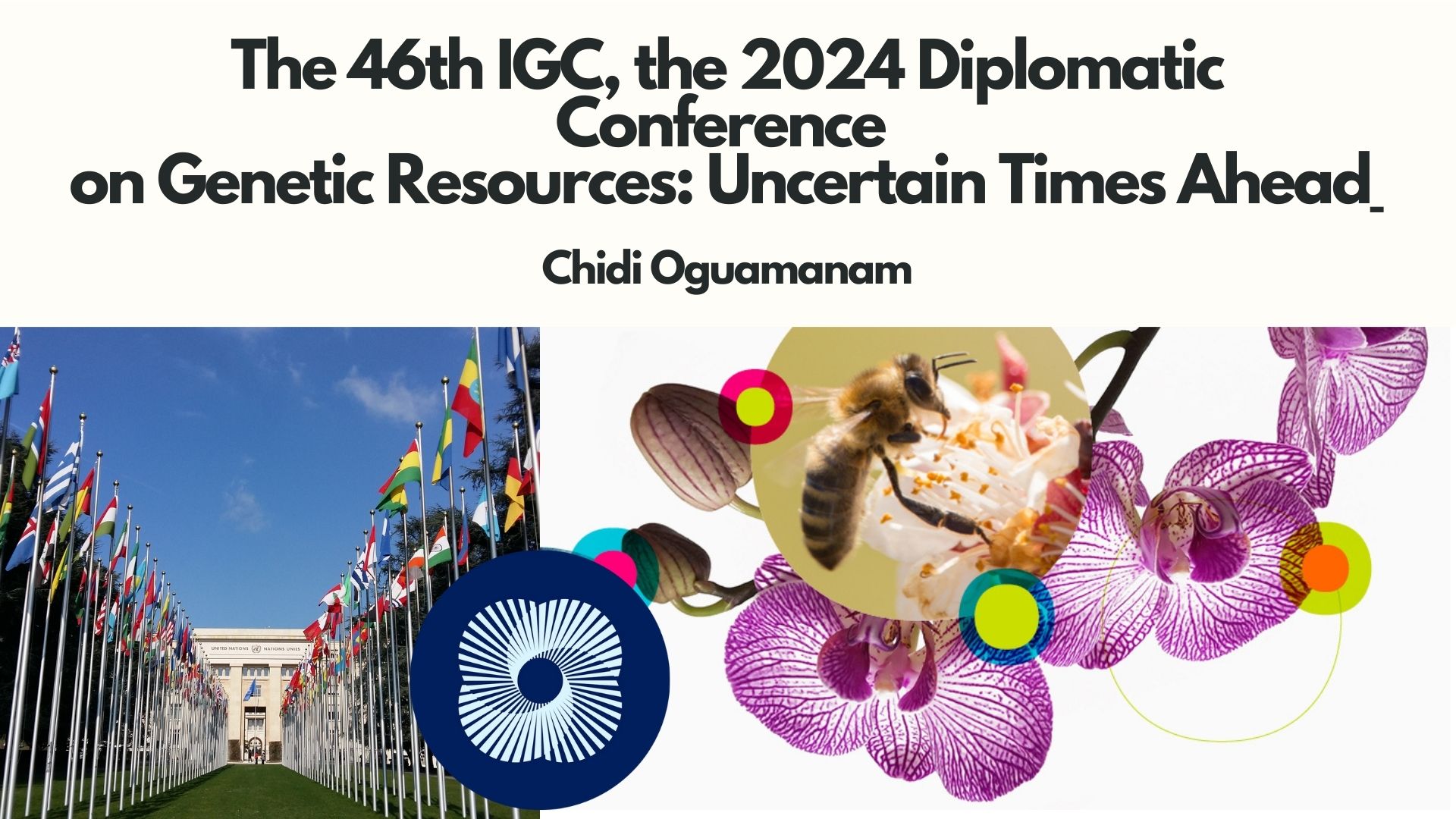The 46th IGC, the 2024 Diplomatic Conference on Genetic Resources: Uncertain Times Ahead
IGC 46 in Context
Between February 27 and March 3, 2023, delegates and experts are reconvening in Geneva for the 46th session of the World Intellectual Property Organization’s Intergovernmental Committee on Intellectual Property and Genetic Resources, Traditional Knowledge and Folklore (IGC 46). The IGC 46 is the penultimate of four sessions exclusively dedicated to “undertake[ing] negotiations on TK and/or TCEs with a focus on addressing unresolved and cross-cutting issues and considering options for a draft legal instrument(s)”. Earlier negotiations on the TK/TCEs text were undertaken pursuant to IGC 44 and 45, and will be further explored finally in the 2022-2023 biennium at the IGC 47 slated for June/July 2023. IGC 47 will also include stocktaking and making recommendations on the subject of TK/TCEs for the 64th WIPO General Assembly in October 2023.
Chair’s GR Text Inspiring New and Consolidated TK/TCEs Text
One of the major highlights, and indeed a historic breakthrough of the WIPO IGC, was the decision of the 63rd WIPO General Assembly endorsing a 2024 Diplomatic Conference on the basis of the Chair’s Text on Genetic Resources. The Chair’s Text is a major component of three-track instruments from the IGC. That decision, which surprised pundits, was a morale booster to demandeur states, who had hitherto become lethargic over the interminable nature of over two-decade negotiations at the IGC. The endorsement also provided the impetus for progress on the remaining texts, namely the TK and TCEs.
Along the line of that interest, the current Chair of the IGC, Jamaica’s Lilyclaire Bellamy, appears committed to ride on the momentum of the Genetic Resources Text. At IGC 45, she unveiled a zero draft of the Chair’s text being a consolidation of the two-track TK and TCEs texts into a single instrument. That bold move was received cautiously by delegates. The Chair has since set up an advisory committee of experts to provide counsel as the Chair’s consolidated TK and TCE text evolves. The Chair’s text initiative is without prejudice to ongoing two-track historic negotiations on TK and TCEs texts which remain the extant and substantive work of the IGC.
New Set of Issues for Closing Gaps on TK and TCEs Text(s)
Meanwhile, through a mixed method of Contact Groups and Ad Hoc Expert Groups, the 44th, 45th and now 46th IGC meetings pursue some progress toward addressing aspects of unresolved issues and gap-narrowing. In this regard, the agenda of the Ad Hoc Expert Group on TK/TCEs for the 46th IGC has identified specific issues requiring expert exploration and elaboration of their ramification in the TK/TCE text. These issues are customary law, formalities, national treatment and transboundary cooperation. The expert group meets on February 26, 2023, just a day before the official commencement of the 46th IGC, which will then take the report of the expert group on advisement to advance negotiations.
Eyes on 2024 Diplomatic Conference on GRs
Aside from the 46th IGC and the remaining meetings of the Committee pursuant to the 2022-2023 biennium, delegates and stakeholders have their eyes on the Diplomatic Conference on Genetic Resources. WIPO has already endorsed a pathway toward the Conference, with a special IGC session and a meeting of the preparatory committee of the Diplomatic Conference scheduled between September 4 and 13, 2023, even as the official host of the Conference has yet to be announced. Regional negotiating blocs and stakeholders are already in a consultative and strategic mood to ensure a hitch-free and result-oriented Diplomatic Conference in 2024.
US Chamber of Commerce Blows a Dog-Whistle on the GR Text
The United States Chamber of Commerce has recently expressed its reservation over the GRs text and the impending Diplomatic Conference. The opposition of the Chamber does not come as a surprise as the United States, along with Japan and South Korea, have been vociferous in their reservations over a legal instrument on genetic resources. Among other things, these countries and their other non-demandeur allies remain opposed to mandatory disclosure of sources and or origins of genetic resources or associated traditional knowledge being “materially” or “directly” part of the invention for which a patent application is sought. According to the powerful US Chamber of Commerce, “experience shows that such patent disclosure requirements have a pronounced chilling effect on innovation and jeopardise the future development of genetic resources-based products”. This position demonstrates continuing lack of balance and insensitivity to the social, cultural, and economic impacts of misappropriation of genetic resources and associated knowledge of Indigenous peoples and local communities, which the GRs text can potentially mitigate.
Perhaps the most troubling aspect of the US Chamber of Commerce intervention is the inaccuracy in characterizing the GR text by suggesting that it proposes disclosure of “human genetic resources”, which the Chamber argues “would dramatically increase the risks to healthcare-related innovation through such ill-considered measures in the light of the relationship of human genetic resources to the conduct of clinical trials and other fundamental aspects of health-related research and development”. In the Chair’s GR text, the definitions of “genetic resources” and “genetic material” as part of the targets of disclosure requirement are taken verbatim from the Article 2 of the Convention on Biological Diversity (CBD). The United States is not a party to the CBD. The remit of that international instrument is unequivocally outside human genetic resources. The position of the US Chamber of Commerce is akin to spilling ink on the genetic resources text in order to shred it ahead of the Diplomatic Conference. The reservations of the Chamber are a clear dog-whistle capable of chilling the excitement and the hard-won sense of progress from the IGC and the anticipations toward the 2024 Diplomatic Conference. They also put the United States on the spot as an active negotiating party at the IGC especially in the build-up to the Diplomatic Conference. Clearly, demandeur and non-demandeur states still have some confidence-building work to do ahead of the Diplomatic Conference. One aspect of that confidence-building is deliberate and careful management of misinformation over the genetic resources text to avoid scuttling long-awaited historic breakthrough from the IGC.






